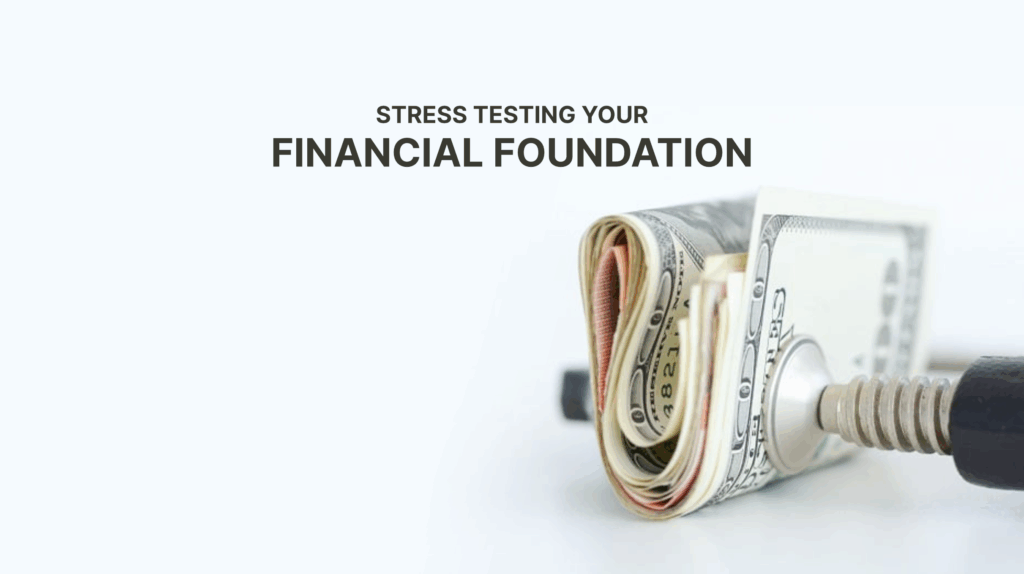Most families spend their financial planning energy on growth—building investment portfolios, maximizing returns, and preparing for retirement. Growth is exciting. But true wealth isn’t just about how much you accumulate; it’s about how well you protect it.
We’ve seen families do everything right on the investment side, only to watch their foundation crack under risks they never considered. Disability, liquidity gaps, and litigation are three of the most overlooked areas. Each carries a different level of probability and severity, but all can derail decades of disciplined wealth-building if ignored. Stress-testing your financial foundation is one of the most valuable steps you can take to safeguard the life you’ve built.
The Silent Risk of Disability
Disability is far more common than most people realize—and far less insured against. According to the Social Security Administration, more than one in four 20-year-olds today will experience a disability before reaching retirement age.1 Yet disability coverage is often the most neglected part of a financial plan.
Many people assume their employer-provided policy is sufficient, but those plans typically replace only 40–60% of income, and often on a pre-tax basis. For high-income earners, the gap can be devastating. Unlike life insurance, which protects heirs after a premature death, disability insurance protects you and your family if you lose the ability to earn during your prime working years. Without it, even the most well-constructed investment plan may not hold.
Liquidity: The More Common Weak Spot
While disability represents a high-probability personal risk, liquidity is the structural weak spot we see most frequently in client portfolios. Families may have millions in net worth, yet still find themselves short on cash when a sudden need arises.
What if you needed $50,000 tomorrow? Could you cover it without disrupting your lifestyle? What about $250,000—or even $500,000? For many families, each of those levels would require a very different response.
The good news is there are multiple tools available to increase liquidity without sacrificing growth. A well-designed plan might include:
- Long-Term Expense Accounts for predictable but irregular needs.
- Securities-Based Lending to borrow against investments without forcing a sale.
- Home Equity Lines of Credit to unlock access to real estate equity.
The right approach depends on your situation, your balance sheet, and your goals. But ignoring liquidity altogether is one of the fastest ways to create unnecessary stress when life throws a curveball.
Litigation: Low Probability, Catastrophic Consequence
As wealth grows, so does visibility. That makes high-net-worth families, business owners, and rental property owners more likely to be targeted in lawsuits—sometimes fairly, sometimes not. Litigation risk is often low in frequency, but when it strikes, the consequences can be catastrophic.
Many assume their retirement accounts are untouchable in litigation, but that’s not always true. In some cases, we’ve seen assets lost in lawsuits that should have been protected. The rules vary by state, and exemptions can differ between bankruptcy and civil liability.
Many assume their retirement accounts are untouchable in litigation, but that’s not always true. In some cases, we’ve seen assets lost in lawsuits that should have been protected. The rules vary by state, and exemptions can differ between bankruptcy and civil liability.
Asset titling, the use of LLCs, umbrella liability coverage, and trust structures are all part of a strong defensive plan. But more importantly, these measures need to be reviewed and updated as your wealth grows and your life evolves. A half-formed LLC or outdated titling structure won’t stand up when challenged.
Other Risks That Deserve Attention
Beyond these three core risks, two others are worth noting:
- Longevity & Health Care Costs: The blessing of longer lifespans also brings the risk of outliving assets or facing significant long-term care expenses. Planning early provides flexibility, while waiting often forces compromise.
- Estate Documentation Gaps: A plan is only as strong as the documents behind it. Wills, trusts, and powers of attorney that are outdated or incomplete can create unnecessary conflict, taxes, and costs for heirs.
Why It Matters
At Strategic Income Group, our mission is clear: empowering individuals to live their best lives and leave a lasting legacy of financial security and positive impact. Protecting your foundation isn’t about fear—it’s about freedom. It’s about having the confidence that no matter what comes, your plan is designed to hold.
That confidence is what allows you to focus on what truly matters: living fully, giving generously, and creating memories with the people you love.
If it’s been more than a year since you reviewed your coverage, asset titling, or liquidity plan—or if you have specific concerns about disability, business risk, or estate protection—now is the time to sit down with your financial planner. A foundation review can reveal gaps before life does.
Loading….
Loading….
Contact Strategic Income Group Today
(480) 466-7070
Because growth without protection is fragile—and protecting what you’ve built is the surest way to safeguard your best life.






















